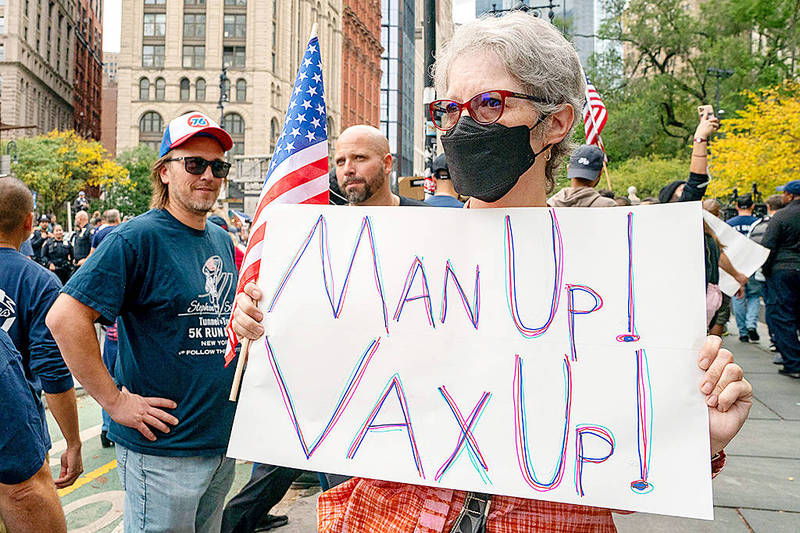《TAIPEI TIMES》 ‘Vax’ chosen as word of the year by OED firm

A person holds a sign urging people to get vaccinated last month at an anti-vax rally in New York City. Photo: AFP
Accolade reflects how use of the short form of ‘vaccine’ rose by 72 times in a year and spread across society
By Barry Taylor / The Guardian
In a year when talk over the virtual garden fence has focused on whether you have been jabbed, jagged or had both doses yet, and whether it was Pfizer, AstraZeneca or Moderna you were injected with, Oxford Languages has chosen vax as its word of the year.
After deciding last year that it was impossible to sum up 2020 in one word, the company that produces the Oxford English Dictionary said the shorthand for vaccine had “injected itself into the bloodstream of the English language” this year during the COVID pandemic.
In September usage of the word “vax” was up more than 72 times from its level last year, the firm said. The word, and others related to vaccination, had also been broadened into a wider range of contexts including “fully vaxxed” and “vax cards.”
Oxford Languages also tracked the rise and fall of vaccine vocabulary, from the usage of “vaccine distribution” in December last year to “vaccine rollout” and “vaccine passport” becoming common parlance by mid-March this year.
Jab, which started off in US English, is now seen far more commonly in Britain, according to Oxford Language’s analysis. In Scotland, jag has proven to be a frequently used alternative.
Vax has also been used in words to describe those against the jab, such as anti-vax or anti-vaxxers.
The company said the trend had been seen in other languages, with the use of vacina being heard 10 times more in Portugal than it was a decade ago, and the French vaccin now almost exclusively referring to the COVID inoculation, according to the report.
Casper Grathwohl, the president of Oxford Languages, said: “When reviewing the language evidence, vax stood out as an obvious choice. The word’s dramatic spike in usage caught our attention first. Then we ran the analysis and a story started to emerge, revealing how vax sat at the center of our preoccupations this year.”
He added: “The evidence was everywhere, from dating apps [vax 4 vax] and pent-up frustrations [hot vax summer] to academic calendars [vaxx to school] and bureaucratic operations [vax pass]. In monopolizing our discourse, it’s clear the language of vaccines is changing how we talk — and think — about public health, community and ourselves.”
The notion of vaccines have been in the English language since the late 1790s, around the time Edward Jenner found that cowpox could be used as a vaccine against the deadly smallpox virus.
The dictionary publisher assessed the frequency in use of the word by looking at news content from around the world.
Mercedes Durham, a reader in sociolinguistics at Cardiff University, said the choice of “vax” made sense because of its adaptability.
“The word itself, to me it almost has a meme quality. With a meme you take the picture and add things, words, on to it. In some ways you take ‘vax’ and add ‘passport’ or ‘anti’ or ‘double’ and because it’s such a short word you can add different things on to it,” she said.
“It’s not that surprising it’s something related to vaccination because these things try to get a spirit of the times, and people have spent more time thinking about vaccines than they ever have before.”
She added that social media were likely to have an impact, meaning words devised by younger generations now had more of a reach.
“Everyone within their own family and their own circle comes up with new words, and most of the time they stay within that circle. What social media can do, with something like vaccinations, is if you see someone tweeting about being ‘double vaxxed’, and then somebody else tweeting about ‘double vaxxed’, then you pick it up — and things that may have been in different small groups becomes much more widespread.”
The report said: “For lexicographers, it is rare to observe a single topic impact language so dramatically, and in such a short period of time become a critical part of our everyday communication. As reports of medical breakthroughs and rollouts (or strollouts) of vaccines emerged throughout the year, Oxford Languages’ monitor corpus of English tracked a worldwide surge in vaccine-related vocabulary.”
新聞來源:TAIPEI TIMES

















